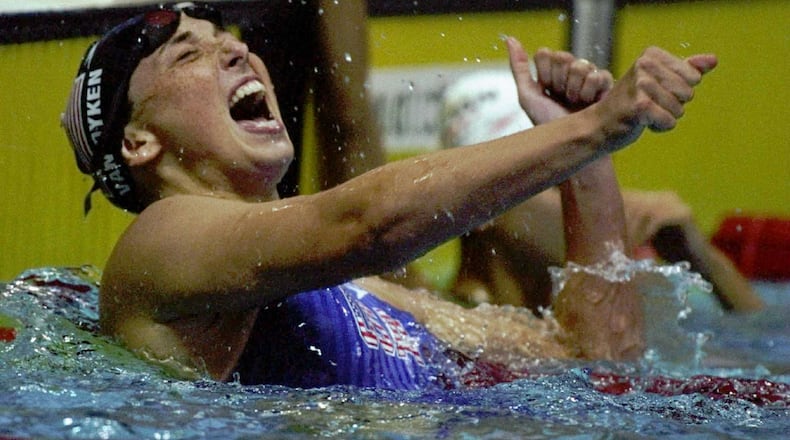On the 25th anniversary of the 1996 Atlanta Olympic Games, The Atlanta Journal-Constitution presents a series of retrospectives produced by the University of Georgia’s Carmical Sports Media Institute. The Eyewitness to History interviews offer the view of someone who was at a top moment on the Summer Games.
In 1992, Amy Van Dyken just missed qualifying for the Olympics, finishing fourth at the U.S. Olympic swimming trials in the 50-meter freestyle. Van Dyken joined USA Swimming’s resident team program in September 1994 and two years later became the first American female athlete to win four gold medals in a single Olympic Games, the last of which came in the 50 free.
The anticipation of this race was unprecedented, as the event had been dominated for several years by Chinese swimmers. Yang Wenyi won the 50 free at the 1992 Summer Games, and Le Jingyi, who had won the 100 free earlier in the Atlanta Games, was the reigning world champion and world-record holder in the 50.
U.S. resident team coach Jonty Skinner helped Van Dyken prepare for the race throughout the day, then watched from high in the stands as she beat Le by three-hundredths of a second.
“The very first time an American athlete walked out on the deck at that Games, it was just ‘Boom,’ because the crowd just went crazy. The second (the U.S. swimmers) were seen coming out of the waiting room, it just erupted in that arena.
“So, I remember when (Van Dyken) came out and it was just the sounds that are made and just standing there and looking at her and just feeling the enjoyment of the ambiance of that environment. And I remember closing my eyes and saying, ‘Let’s do this, let’s finish this off.’ She had a fantastic meet up that point in time. I felt like she had everything she needed to win this race.
“I analyzed her race from the morning preliminary swim and I also analyzed the races of her major competitors, with her No. 1 being the world champion and a world-record holder Le Jingyi. ... I went through her race with her and said, ‘This is where you are going to beat this girl. ... You are going to take a breath at 35 meters, and when you look over for your breath -- because you’re always going to be breathing to the side where she is -- you are going to see that she is ahead of you. Don’t panic because you have a much faster (last) 15 meters than she does.’... She just had to find that extra energy and that courage, or whatever it is, to get by this girl and get her hand on that wall first.
“Once we reviewed the race plan that afternoon, I checked in with her at the end of the warmup and after that I let the athletes be. They are the ones that have to get the job done. You don’t want to go over there and be micromanaging anything about last-second details and stuff like that. That’s not my style; get it in place and let them go race.
“A lot of people tend to congregate at the deck level and watch races. I have always been a coach that loves to go watch from more of a bird’s-eye view. So, I was really up there, with the guy filming the event, standing right next to him looking down, watching the whole thing unfold.
“(Van Dyken) had this habit of, she would always go to the water and kneel down, always scoop some and splash some water on her body from the pool prior to the race. She tended to get some in her mouth. She would, gently speaking, spit it in the lane of the opponent she was going to race.
“She was always going to be slightly behind at the start. It was about that time (that she took the breath at the 35-meter mark) you just start to see that change in the mood. You just start to see her start to make that move. Part of you is going, ‘Please, please make this happen for her,’ and the other part of it is like, ‘Yeah, she’s got this.’
“By the time she swam the 50 there was a pretty good understanding in the public’s eye that the Chinese swimmer had been the best 50 freestyler in the world for years. ... I think the crowd knew that this was going to be a huge event between the two of them and when (Amy) came out on top, I suspect it was this extra little visceral feeling on the public level like: ‘Yeah, we got that one. We were able to be the underdog and defeat the athlete that was maybe supposed to win.’
“You spend a lot of time helping these athletes chase their dreams. There was a lot of hard work between the fall of ’94 and the summer of ’96. To see it realized in the way it was realized, you just have to feel lucky, to have been a part of something like that.”
Amelia Green completed this interview as a student at the University of Georgia’s Carmical Sports Media Institute.
About the Author
Keep Reading
The Latest
Featured

